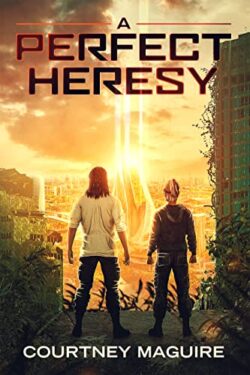 A Perfect Heresy
A Perfect Heresy Dystopian Fiction, Space Marine Science Fiction, MM Fiction
Independent
June 1, 2023
Kindle
311
Amazon
Dystopian science fiction perfect for fans of Ursula LeGuin's Left Hand of Darkness and The Hunger Games.
The City was prosperous once, a beautiful utopia made up of perfect people unplagued by disease or infirmity, existing under the benevolent eyes of the Mother. Its high walls guarded it from the ugliness of the world, making it possible for its Citizens to live by the Mother’s will.
But then, the Outsiders rebelled.
Tired of being oppressed and exploited by the City for their resources, a Resistance rose up against the City’s rule, attacking its soldiers and drawing them into a genocidal war in which there were no winners. Jax, once a City soldier, now a Heretic, is just trying to make xyr way home when xe meets Koi, a sick Outsider in search of xyr last remaining family, a sibling abducted by City soldiers. Jax’s fragile faith will be tested once again as their journey to the City center exposes truths neither of them were prepared for. Can two people from opposite sides of the wall help each other find what they’re looking for?

Reviewed By Ulysses Dietz
Member of The Paranormal Romance Guild Review Team
I give this five stars, because, by the end, I was entirely caught up in the story and moved by the powerful emotional relationship between Jax and Koi.
In a cosmological prologue, the reader learns that this is a universe where all beings are androgynes. The creative force of this world—known as the Mother—made all humans the same (in her image) so as to eliminate strife. The Mother assumed that her children would get the point and make a better world.
Well, you know that humans always screw up, right?
It is human nature to create divisions, to form hierarchies, to categorize and evaluate others based entirely on inherited cultural prejudice and the misinterpretation of scripture. Even human beings created to be the same will disregard their creator and insist that everyone is different.
And that’s the world as we find it in Perfect Heresy. There’s The City, with its population, known as Citizens; and there’s the Rim, with its population called Outsiders. Us and Them. In a classic sort of proto-Marxist vision, all resources come from outside the City. The Outsiders grow, mine, and manufacture everything, working in massive, noisy factories and processing plants. Then the black trucks from the City come and take most of it away, inside the massive wall that encircles the city.
At the center of the City is the Spire, the monument to the Mother, who is represented by a person known as the Voice. The post-apocalyptic vision of this world that we see has been caused by two things: the rebellion of and war against the Outsiders, and the Fall, which, near as I can tell, is the death of the Voice without an heir. The greedy blindness of the Citizens and their paranoid ignorance toward the Outsiders has ruined things for everyone.
Koi is a young person in the Rim, just trying to survive after the killing of a parent and the abduction of a pregnant sibling. Koi’s life is saved in a picked-over warehouse by Jax, a former Citizen Soldier, now a heretic, despised by Citizen and Outsider alike. The arc of the story is their adventure together, going to the City to find the kidnaped sibling, Sky, and the baby.
I’ll note now that these androgyne people use only the pronouns xe, xyr, and xem. It’s irritating at first, but after a dozen pages or so I got used to the pronouns, understanding the author’s purpose. Unlike the omegaverse, every person in this world can both sire a child and bear a child.
It is a complicated thing to create a non-gendered world, and when typos slip in (he instead of xe), it rattles the reader’s suspension of disbelief. Also, the word “man” is used several times, apparently with intention. This was distracting and, for me, had no purpose.
Apart from that, I found distinct gendering of the characters, however subtle, following tropes that we all know well from other types of genre fiction. Jax is tall and strong and has facial hair; while Koi is petite and blond and smooth of face. For all their pronouns, some characters are presented in ways, or with names, that suggest maleness or femaleness (Tilly, and General Donovan). I was unsure whether or not this was simply an ironic part of this world’s androgynous “sameness.”
Given the author’s fascination with Japanese culture, she probably has somewhere in mind the androgynous prettiness of so many anime characters. Just as in m/m fiction, there are big burly men (and women) and small, delicate men (and women). I found myself wishing the author had explored the Mother’s creation of everyone as “the same” a little more. Of course, the inhabitants of this world have no concept of separate genders, only of separate roles within society. But the readers of the book come with lots of cultural baggage that can impede our understanding (at least, this old cis gay man does).
All this said, I was in tears more than once as I read about Jax and Koi and their struggles. This book is a unique take on some age-old ideas about cultures and how they rise and fall.
